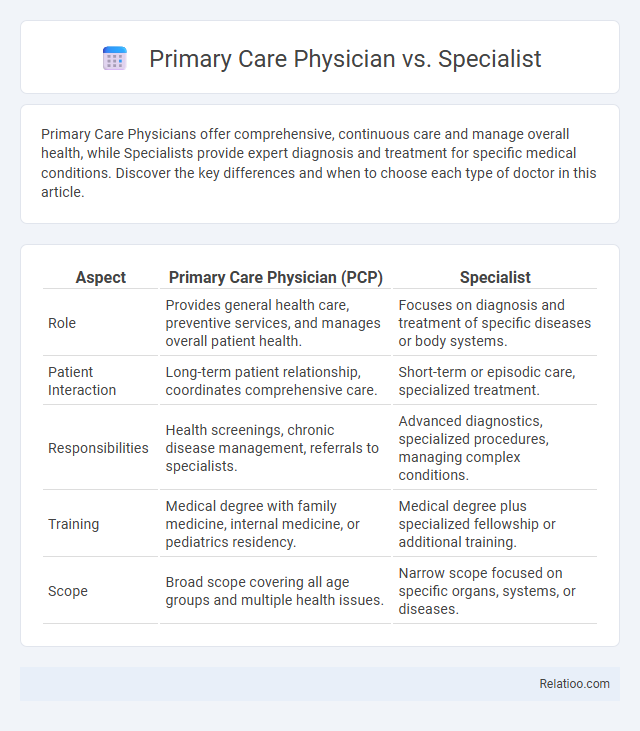Primary Care Physicians offer comprehensive, continuous care and manage overall health, while Specialists provide expert diagnosis and treatment for specific medical conditions. Discover the key differences and when to choose each type of doctor in this article.
Table of Comparison
| Aspect | Primary Care Physician (PCP) | Specialist |
|---|---|---|
| Role | Provides general health care, preventive services, and manages overall patient health. | Focuses on diagnosis and treatment of specific diseases or body systems. |
| Patient Interaction | Long-term patient relationship, coordinates comprehensive care. | Short-term or episodic care, specialized treatment. |
| Responsibilities | Health screenings, chronic disease management, referrals to specialists. | Advanced diagnostics, specialized procedures, managing complex conditions. |
| Training | Medical degree with family medicine, internal medicine, or pediatrics residency. | Medical degree plus specialized fellowship or additional training. |
| Scope | Broad scope covering all age groups and multiple health issues. | Narrow scope focused on specific organs, systems, or diseases. |
Understanding Primary Care Physicians
Primary care physicians (PCPs) serve as the first point of contact for patients, offering comprehensive and continuous care for a wide range of health issues. They coordinate preventive care, manage chronic diseases, and refer patients to specialists when advanced diagnostics or treatments are required. Understanding the role of PCPs is crucial for effective healthcare navigation, as they facilitate patient-centered care and ensure communication across different healthcare providers.
Role and Responsibilities of Specialists
Specialists possess in-depth expertise in specific medical fields, diagnosing and treating complex conditions beyond the scope of primary care physicians. Your health outcomes improve when specialists perform advanced procedures, interpret specialized tests, and develop targeted treatment plans tailored to your unique medical needs. Their role complements primary care by providing focused care that addresses specialized medical concerns efficiently and effectively.
Key Differences Between Primary Care Physicians and Specialists
Primary care physicians provide comprehensive, continuous care, managing overall health, preventive services, and common illnesses, while specialists focus on specific medical conditions or organ systems, offering advanced expertise and targeted treatments. Primary care emphasizes coordination of care and referral to specialists when necessary, whereas specialists concentrate on diagnosis and treatment within their particular field, such as cardiology or dermatology. Patients often rely on primary care physicians for routine check-ups and broad health concerns, turning to specialists for complex or chronic conditions requiring specialized intervention.
When to See a Primary Care Physician
You should see a Primary Care Physician (PCP) for routine health screenings, preventive care, and management of chronic conditions such as diabetes or hypertension. PCPs coordinate your overall health, provide referrals to specialists when complex or specific issues arise, and address a broad range of symptoms early. Consulting your PCP first ensures timely diagnosis and efficient treatment, avoiding unnecessary specialist visits.
When to Consult a Specialist
Consult a specialist when symptoms are complex, persist despite primary care treatment, or require expert intervention beyond the scope of a primary care physician's expertise. Conditions such as chronic diseases, unexplained pain, or specialized diagnostics often necessitate specialist evaluation to ensure accurate diagnosis and targeted therapy. Timely referral by the primary care physician optimizes patient outcomes and reduces the risk of complications.
Referral Process Explained
The referral process involves a Primary Care Physician (PCP) evaluating a patient's health concerns and determining the need for specialized care, then directing the patient to a relevant Specialist. Specialists focus on specific medical fields and provide advanced diagnostics, treatment plans, or procedures that PCPs cannot perform. Efficient communication between the PCP, Specialist, and Patient ensures coordinated care, timely appointments, and comprehensive management of medical conditions.
Benefits of Coordinated Care
Coordinated care between your primary care physician and specialists ensures comprehensive management of chronic conditions, reduces medical errors, and enhances communication across healthcare providers. This collaboration optimizes treatment plans by integrating diverse expertise, leading to improved patient outcomes and more personalized care. Efficient coordination also minimizes redundant tests and streamlines healthcare costs, benefiting both you and the overall healthcare system.
Cost Comparison: Primary Care vs Specialist Visits
Primary care physician visits typically cost significantly less than specialist consultations, with average copays ranging from $20 to $50 compared to $75 to $150 for specialists. Insurance plans often require lower out-of-pocket expenses for primary care to encourage routine health maintenance and early disease detection. Patients benefit financially by using primary care physicians as first contact points, reducing unnecessary specialist referrals and overall healthcare expenditure.
Patient Outcomes and Satisfaction
Primary Care Physicians coordinate overall healthcare, emphasizing preventive measures and early diagnosis that often lead to improved patient outcomes and higher satisfaction due to personalized, continuous care. Specialists provide targeted treatment for complex conditions, enhancing outcomes through expert knowledge, which can increase patient satisfaction when specialized interventions are necessary. Your collaboration between a Primary Care Physician and Specialist ensures comprehensive care, optimizing health results and patient experience through seamless communication and tailored treatment plans.
Choosing the Right Healthcare Provider
Choosing the right healthcare provider depends on your specific health needs and goals. Primary Care Physicians manage general health concerns, provide preventive care, and coordinate referrals to specialists for complex or chronic conditions. Understanding the distinct roles of specialists, who offer advanced expertise in particular medical fields, helps you make informed decisions for targeted treatments and improved health outcomes.

Infographic: Primary Care Physician vs Specialist
 relatioo.com
relatioo.com